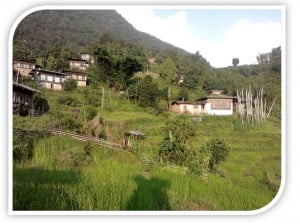The stunning landscape of Bhutan, from snow-capped peaks and pristine forests to sacred caves and mountain lakes, is also home to deities who protect the land. And to appease the deities, different regions have different festivals. One such festival, unique and ancient as the land itself, is Naru or Bja Kam Naru.
This ancient traditional bon festival celebrated in the remote village of Ketokha in Chukha is as old as the land itself. The festival is an annual event and is carried out to appease the local female deity – Yang-ta. It is believed that the deity, once appeased, brings harmony, riches and tremendous good fortune to the valley and its inhabitants.
And so, the festival begins on the fifteenth day of the tenth month of the Bhutanese calendar. The five-day festival is attended by village elders and children alike. For the inhabitants of Kethoka, it is a time of merriment, games, prayers, and of course, feasts. It starts with the deity being ridden atop a white horse from the local temple to the Aum Yang-ta gang that literally translates to the hilly place of the female deity. There, the village shaman will offer chang phe, tho phe (food & beverages) and recite prayers while the crowd will offer nyndar and invite the deity to their villages for her blessings.
And while archers will ready themselves for a fierce game of archery between rival villages, the zhay-pai (singer) ties a white scarf on a long pole and leads the crowd back to their villages. It is believed that the white scarf represents purity and the deity Yang-ta. In the villages, people queue up to receive blessings by offering sung (incense).
On reaching the village, the scarf bearer and the crowd will take three rounds of the temple before entering the shrine where the scarf will then be placed at the altar along with the statue of the goddess. There, the head lama will bless the archers with holy water and the village chief will strictly read out the dos and don’ts for the five-day archery matches that will soon follow.
During the night of the first day of the festival, young boys go from door to door to collect rice and meat. They sing and dance while chanting mantras as they drink local brews offered by the ladies of the house. It is believed that evil spirits are shooed away with the chants. Next, folks from villages near and far gather at the temple where the feast is prepared, and as they eat, they sing, dance and court members of the opposite sex. This carries on for the next three nights. While the days are spent praying, drinking and cheering for ones archery team, the nights are as colourful and fraught with sexual innuendos.
Today, what has changed is that the communities no longer slaughter animals to appease the deity.


